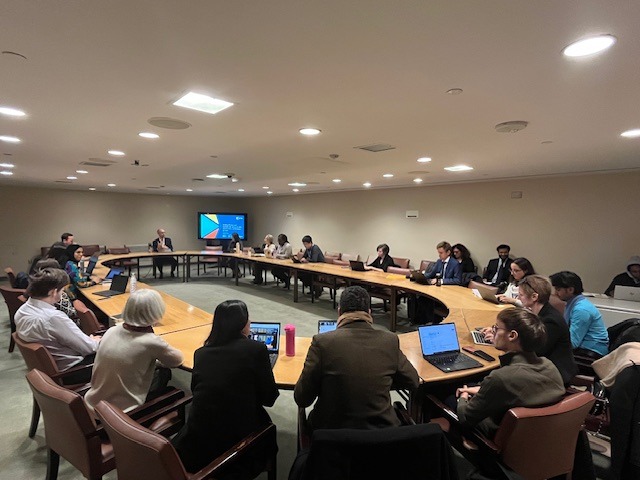Effective taxation is the foundation for financing development. While lower-income countries require additional resources, taxes provide the bulk of public revenues, and are necessary for accessing other kinds of finance, be that borrowing, blended finance, or climate finance.
On December 3rd, the ICTD and LoGRI hosted a side event at the Second Preparatory Committee Session of the Fourth International Conference on Financing for Development (FfD4). It has been nearly a decade since the last conference, which resulted in the Addis Ababa Action Agenda. While it acknowledged domestic resource mobilisation as “critical” to realising sustainable development, only seven of the 115 paragraphs in the outcome document focus on tax issues.
The FfD4 process offers an opportunity to construct a more comprehensive agenda for strengthening tax systems.This has begun with the recent release of the Elements Paper, which brings forward a much wider range of tax issues than we saw in 2015. While the focus previously was much more on cross-border issues like illicit financial flows and tax incentives for foreign investment, the new draft proposals include more attention to domestic level tax issues.
While this is very positive, the proposals could be strengthened by better reflecting the reform challenges and effective solutions identified by experience and research. At the side event, experts from ICTD, LoGRI, and the World Bank outlined how this could be done in relation to four priority areas:
1. Taxing the wealthy
The Elements Paper proposes to: “Commit to enacting or strengthening taxes targeting high-net-worth individuals, including through international cooperation, with countries choosing the best policy mix for their economies.”
While it is good to see taxes targeting high-net-worth individuals (HNWIs) now included explicitly, the proposal is quite vague on how best to accomplish this. In his presentation, Dr Wilson Prichard advocated for a ‘nuts and bolts’ approach, describing proven strategies for raising additional revenue from the wealthy in lower-income countries (LICs).
While new wealth taxes may hold promise in the future, ICTD research in Uganda, Rwanda, Sierra Leone and Nigeria demonstrates that LICs would be better served by first improving the performance of existing taxes. Most LIC’s tax codes already include taxes that bear most on the wealthy, such as those on personal income, property, and inheritance. However, LICs collect far less from these tax handles than high-income countries (HICs) do.
For instance, HICs collect three times more revenue from personal income taxes as a proportion of their GDP than LICs do. The real issue is lack of enforcement, but research shows that when there is political support for enforcement, rapid and significant improvement is possible.
Closing these gaps in collection from HNWIs is important not only for greater revenue collection, but also reducing inequality and improving perceptions of fairness and public trust in tax systems. Dr Prichard recommended that the FfD4 agenda recognise this, as well as incorporating concrete strategies that have proven to be effective, including:
- Using simplified strategies to identify wealthy taxpayers
- Creating specialised HNWI units within tax administrations
- Making consistent use of enforcement tools such as tax clearance certificates
- Focusing on underperforming tax handles, including taxes on personal income, on professional income, on rental income and on property
- Enhancing data sharing between public bodies, banks, and revenue authorities
- Strengthening international cooperation on exchange of information (to facilitate taxing assets held abroad), with a particular focus on ensuring LICs benefit
2. Strengthening Subnational Taxation
The Elements Paper proposes to: “Enhance subnational finance by strengthening the capacities and technical knowledge of local authorities, helping them to diversify sources of income, and promote stable and transparent intergovernmental financial transfer systems and equalization mechanisms.”
In her presentation, Dr Colette Nyirakamana argued that FfD4 should present a more substantial commitment to subnational revenue raising because it is an area where there is enormous potential for improvement, not only in terms of revenue, but also for meaningfully advancing decentralisation and forging stronger social contracts at the local level.
She advocated for the need to draw specific attention to property taxes, as they represent the backbone of subnational finances. Here’s why:
- Revenue: Governments stand to collect significant revenue from property taxes as they are levied on a large and stable base (land and buildings that are easily identifiable)
- Equity: Unlike many other sources of local government revenue (like parking and market fees or poll taxes), property taxes are very progressive
- Economic Efficiency: Economists have long favoured property taxes because compared to taxes on income or consumption, they are the least economically distortive
- Improving other government functions: Mapping and collecting data on properties can contribute to better urban planning, land administration, and local service delivery
- Strengthening accountable local governance: As they are highly visible and local, property taxes have strong potential to enable bargaining between citizens and governments about how revenues are used and to strengthen social contracts.
Despite these advantages, property taxes are by far the worst performing major tax type across LICs. High performing countries collect more than 2% of GDP in property taxes, while available data suggests that most LICs collect less than 0.2% of GDP. This shows how there is huge potential for increasing revenue from property taxes, and we know from recent ICTD/LoGRI evidence that rapid improvement is possible.
In less than a year, a property tax reform program in Freetown, Sierra Leone, managed to double the number of properties registered, triple revenue collection, and dramatically improve equity, with virtually the full revenue increase coming from effective taxation of high-value properties. This was made possible by a combination of political leadership, the use of simplified and locally appropriate models (for property valuation and information technology), as well as an emphasis on transparency and trust-building by linking revenue collection to local service delivery.
3. Taxation of the informal sector
The Addis Agenda included the commitment: “to improve… tax systems, including by broadening the tax base and continuing efforts to integrate the informal sector into the formal economy,” while the Elements Paper also includes a proposal to support countries “to formalise the informal economy.”
In her presentation, Dr Vanessa van den Boogaard critiqued this for ignoring three important facts:
- The most common methods of taxing the informal sector (using simplified tax regimes) don’t raise much revenue. Across Africa for example, revenue from simplified tax regimes accounted for only 0.5% of domestic revenue on average in 2022.
- Current methods of taxing the informal sector are regressive, with a disproportionately high burden on the lowest income earners, and therefore also on women. In Africa, 60% of countries using simplified tax regimes do not have a minimum threshold, and even when these exist they are often low or not adjusted for inflation, and so many people below the poverty line end up in the tax net.
- Efforts to “formalize the informal economy” are often ineffective. Research shows that efforts to expand the tax base via mass registration drives often disproportionately capture lower-income individuals and firms (like market vendors and street traders) because they are more visible than higher income operators (like professionals or wholesalers), who are better able to hide their income. These drives lead to tax registries bloated with poor quality data that revenue administrations cannot act upon, and increases the number of taxpayers filing nil returns rather than increasing revenue collection.
It’s clear that we urgently need a better approach to taxing the informal economy. According to the ILO, it comprises more than half the global labour force, and informal sector taxation is thus the central way most people in lower-income countries engage with the tax system.
Dr van den Boogaard argued that with regard to taxing the informal sector, the FfD4 agenda should include a commitment to improving progressivity. Greater equity can be achieved by increasing the focus on taxing higher income individuals in the informal sector. This can be done effectively by working with professional associations and subnational governments to determine sector-specific approaches, though further research is needed to validate effective strategies. Identifying undeclared income and profits in the formal sector (particularly associated with HNWIs), is also an important objective in terms of addressing informality.
She also advocated for including an explicit statement about protecting the lowest income informal earners, many of whom are living on survivalist incomes. Simplified tax regimes should have minimum thresholds and rates should be regularly adjusted to reflect inflation. And in terms of formalization, interventions should focus on improving taxpayer services and access to social protection for small businesses, rather than increasing the number of taxpayers in registers.
4. Digitalising tax systems
The Elements Paper proposes to: “Encourage digitalization of tax administrations, including commitments to provide developing countries with technical support and investments in IT-systems and artificial intelligence.”
In her presentation, Dr Oyebola Okunogbe from the World Bank Development Research Group argued that while technology provides powerful tools for improving the core functions of tax administration, the value of those tools in improving revenue performance depends on how tax officials use them and the broader political environment.
Digitalisation is far more than a technical process. Political incentives and constraints determine the authorizing environment for investing in tax technology and the ways in which tax officials will use it.
Dr Okunogbe highlighted that the key challenge with digitalisation is to balance the strengths of technology on one side (which can provide standard interfaces to all taxpayers and allow processing of massive amounts of data), with the strengths of human tax agents on the other (who may have important contextual knowledge from interactions with taxpayers, but also may be prone to exhibit bias, or even collude with or extort them).
When implementing new technologies, she argues it is vital to invest in the capacity of tax officials and ensure their incentives are aligned with organisational objectives. It is also important that institutional reform accompanies technology adoption. For example, when new kinds of information become available, audit processes should be systematically overhauled to make use of it for better targeting. And ultimately, it is important to build broad-based political support for expanding taxation in order to maximize the impact of technology.
Looking Ahead
While the side event only covered these four topics, there are more issues the ICTD’s research can inform to make the FfD4 agenda on taxation as comprehensive and effective as possible. Please stay tuned for more as we continue engaging with stakeholders on the road to Seville!




